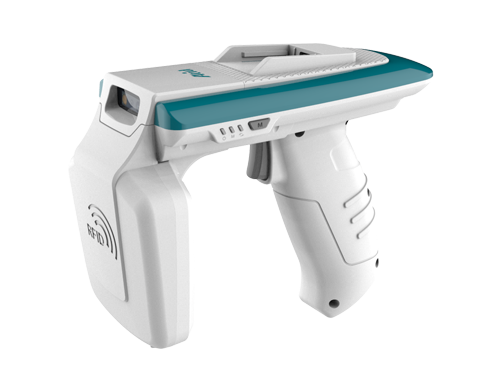ATID ATS100 Introduction and Setup
- admin
- Jul 16, 2018
- 2 min read
The ATID ATS100 reader is a rugged barcode and UHF RFID reader that works with Android, iOS, and Windows. It offers both wireless connection through Bluetooth, and wired connection to Android and Windows using USB. Other features include IP65 dust and water protection, and 1.5m drop protection. When using Android, we recommend using the USB communication mode for a consistent, reliable connection. Bluetooth should also work well, but we preferred a wired connection. For additional information, refer to the ATS100 specification sheet.
ATS100 Configuration
The ATS100 configuration for Bluetooth or USB is straightforward, once you get the hang of it. It will continue to use the saved communication and connection mode until you go through this process again.
Start with the reader powered off (LEDs are off).
Press and hold the ATS100 trigger, then hold the power button until the device turns on.
Use the communication-mode button (two-arrow button, next to power) to cycle between Bluetooth (Green) and USB (Red).
Use the “M” connection-mode button to cycle through the Bluetooth or USB connection modes.
There are 3 Bluetooth connection modes:
BLE Mode - direct scanner control with iOS (fast blinking green),
SPP Mode - direct scanner control with Android or Windows (slow blinking green)
HID Mode - keyboard wedge (solid green).
There are 2 USB connection modes: VCP Mode - direct scanner control with Android or Windows (blinking red), and HID Mode - keyboard wedge (solid red). After selecting the mode button above (e.g. USB+VCP), press and hold the power button until the ATS100 beeps. The device will restart in that mode.
Open the Atid configuration app (or another app that supports the ATS100) if you have selected a mode with direct scanner control. If you have selected one of the HID modes, open a blank document, spreadsheet or other text application.
ATS100 Operation

Once paired and configured, the operation of the ATS100 is straightforward. To use it effectively, you need either a dedicated application written to use the ATS100 SDK, or you can scan tags and barcodes into a spreadsheet or text document (with HID mode). Inside the SDK, you will find the sample application (and source code) that is demonstrated in the video. In addition to the Inventory demo, the sample application can configure reader settings, read tag memory and search for a specific tag. In our testing, the ATS100 could easily read identification-card UHF tags at over 20 feet.
The ATS100 is a great choice for combining UHF and barcode functionality into a single device. The full ATS100 User Guide has additional information that you may find helpful. Please contact us for additional information about the ATS100. For custom solutions, don’t start from scratch. We have Android, IoT and cloud building blocks to help you jump-start your solution.
Purchasing Information
If you would like the purchase the ATS100, please contact us or visit our online store.

Comments